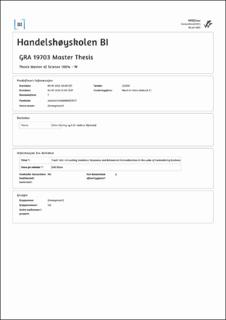Trash Tall!: Unraveling Emotional Responses and Behavioral Rationalizations in the wake of Contradicting Evidence
Master thesis
Permanent lenke
https://hdl.handle.net/11250/3100883Utgivelsesdato
2023Metadata
Vis full innførselSamlinger
- Master of Science [1621]
Sammendrag
This study serves as a contribution to the green marketing paradigm,
specifically under research about promotion of sustainable behaviors such as recycling of household waste. For the past decades, recycling has been
exclusively advocated as the “holy grail” for individual contribution towards sustainability, in which pro-recycling promotions have flooded the Norwegian
communication channels. However, this research deviates from previous research in the sense that, due to recent developments and disclosures within
the recycling industry, offer skepticism towards the alleged sustainable impact of recycling that this paradigm currently lacks. Furthermore, this recent information contradicts many of the previously assumed benefits from recycling, in which this research investigates the rationalization and processing
of this contradicting information from a consumer’s perspective. Uncertainty
management theory holds that contradicting information in general, is hard for
us humans to process in the sense that it can elicit emotional responses such as confusion, lack of credibility in information source, insecurity, a sense of hope and optimism, and/or indifference in an attempt to reconcile the conflicting
information. Through in-depth interviews with Norwegian students from various study programs we investigated how our respondents processed the contradicting evidence about recycling, as well as their resulting emotional,
attitudinal and/or behavioral alterations. Our findings disclose a range of
different emotional responses ranging from negative, to positive, to neutral emotional responses as identified by uncertainty management theory. However,
despite differing emotional responses, all of our respondents express that they
will continue their recycling behavior regardless of the contradicting evidence.
This is further found to be a combination of unyielding unconscious habits,
their high trust in government which elicit a hopeful and optimistic attitude for
the “recycling problem” to be solved by trusted stakeholders, as well as their
generational attitude towards sustainability. In which, younger generations are found to feel more guilt and anxiety for their negative environmental impact than older generations. Where, the biggest barrier to contribute towards sustainability is cost-related. Thus, our respondents perceive recycling to be the “only” sustainable action their budget allows them to partake in, and
consequently refuse to acknowledge the contradicting evidence.
Beskrivelse
Masteroppgave(MSc) in Master of Science in Strategic Marketing Management - Handelshøyskolen BI, 2023
